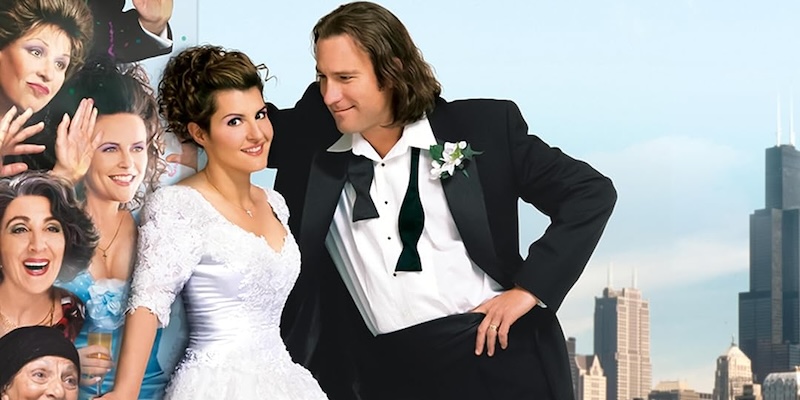Opa! It’s All Greek to Me! Subverting the Tropes of Greek Culture in Media
Henriette Lazaridis on Rachel Cusk, “My Big Fat Greek Wedding,” and Writing a Novel Where Greeks Speak for Themselves
As the only child of Greek parents, I grew up in America familiar with the well-meaning misunderstandings of my parents’ native land. Let me set the record straight: Greeks do not smash the china when they’re feeling joy, and they do not shout “opa!” to begin a celebration. Plate-smashing developed at bars where some Greeks would perform for tourists this spectacle of conspicuous consumption. And “opa” is usually what you say to yourself if you’re about to stumble or stub your toe, or need to watch out.
Contrary to popular belief, Greece is not all islands and whitewash and sea–though there is plenty of that. It’s a mostly mountainous country–you can ski there–and the mainland offers landscapes of forest and limestone cliffs. Athens, too, is much more than the stark pale marble of its ancient ruins. The city is full of street art (and graffiti) and up-to-the-minute work in design and architecture. Much of Athens isn’t very lovely, though it is always lively.
When I wrote my new novel Last Days in Plaka, it was this contemporary, living Athens I wanted to capture. The characters in the novel (Greeks, a Greek-American, Ethiopian transplants to Athens) live in the Athens of today–a city that’s as scruffy as parts of it are elegant, as chaotic as it is rigidly classical, a city beginning to change with its new and vibrant population.
Long before the tourism boom that saw thirty-two million visitors in 2023, Greece was a stop on the more ambitious versions of the nineteenth-century Grand Tour. The country has had the dubious honor of featuring in the imaginations of other cultures for centuries. Lord Elgin loved ancient Greek culture to the point of theft. Byron’s admiration of the Temple of Poseidon involved carving his initials in the stone. And countless other writers and painters and sculptors and architects have expressed their admiration for the country through the gentler methods of allusion, imitation, and inspiration.
Over time, certain tropes have emerged, to go along with the “opa” and the whitewash, in the way that Greece exists in the contemporary popular imagination. There’s the island sojourn that allows a person (usually a woman) to reset her life and find happiness–usually with a swarthy and passionate lover. There’s the boisterous and chaotic Greek family into which the quiet American is thrust–and whose embrace transforms and saves them. There’s the blinding white of Hellenic light that compels purity of thought and action for characters in stark and hyper-intellectual dramas.
Like good tropes, each of these speaks to a certain truth. There is something blinding about the light of a Greek summer. A story that used to be told about a nineteenth-century visitor to Mykonos said that he had taken a boat across to Delos and been so awestruck by the sun that he’d gone mad. There is a beautiful warmth in Greek family interactions and a sincerity to even casual encounters. Where an American cashier wishes you a nice day without making eye contact, the Greek counterpart embarks on a full conversation that may be grumpy but is almost never disengaged.
Writers including Rachel Cusk, Louis de Bernieres, and Barry Unsworth—just to name a few—have hit on certain truths about Greece and Greek experience. Cusk’s Outline is preoccupied with transits, arrivals and departures, estrangements and poor connections–patterns of movement that chime with Greece’s position as the site of travel. Cusk’s characters are all dealing in some way with displacement and absence. There’s a sense in the novel that while Greece is presumed to be a place of logic, the characters who pass through it and momentarily inhabit the narrator’s sphere are themselves unable to acquire that clarity.
Even when a character does make a claim to Athenian aesthetic purity, that claim is undercut for its pretention–as we see with the Irish writer Ryan who boasts that “though he might have seen the Parthenon sitting like a gold and white crumbling crown on the hilltop with the fierce pagan blue of the sky behind, he wouldn’t have felt it, as he was able to feel it this morning, airing the shaded crevices of his being.” He turns the simple act of getting up early into a triumph of appreciation.
Literary depictions of Greece are varied and often sophisticated. And yet it’s a work of pop culture that, in my view, captures the culture best. No, not the curated images of Instagram; or Mamma Mia! with its dancing, opa-shouting islanders. It’s The Sisterhood of the Traveling Pants that gets Greek culture right. In that movie adapted from Ann Brashares’ young-adult novel, Greeks appear authentically as themselves, and Greek culture is presented not as a figure of fun, or an icon of highest intellectualism, but as human, imperfect, complex.
Second in the rotation of four friends who travel with the magical pair of jeans over one summer, the Alexis Bledel character Lena visits her family’s home in Santorini. Despite the familiar island setting, the movie rises above the tropes of Greece-as-island through its use of one particular device. Early in Lena’s arrival among her family, we get something the medium of the novel cannot achieve: we hear Greek characters speaking Greek to each other.
Granted, we often see non-English-speaking characters acting in their own language on screen. But either Ken Kwapis the director or author Brashares working with Delia Ephron as screenwriters (with Elizabeth Chandler) have decided not to subtitle what the Greek speakers are saying. Lena’s relatives cajole and console, debate and suggest, about what to cook and eat and wear.
And all the while, the non-Greek-speaking viewer is left out of the scene. This is a risk, since the non-Greek speaker might simply ignore the figures chatting in the background. Instead, the device draws your attention. Almost because the scene isn’t subtitled, it plays out as if without an audience, not catering to anyone who doesn’t already understand. Thus, the moments the actors portray are free from histrionics and stereotype. These are Greeks being Greek as if no one (foreign) is watching.
We see a similar device in one scene from the otherwise voluble My Big Fat Greek Wedding. The wedding that is the whole point and focus of the movie plays out almost entirely free from English. Notably, as the priest sings the Greek Orthodox wedding liturgy, we do see moments that nod to the non-Greek-speaking audience. The bride’s procession down the aisle jokes at the usual Greek stylized spit (against the evil eye) with actual spitting.
The American mother’s incomprehension of the Greek is accepted, but with the familiar line “it’s all Greek to me.” And Toula explains to her new husband and to the audience the significance of what’s about to happen as they take their first steps as a married couple. Still, long stretches of the ceremony play out with only the ecclesiastical Greek as soundtrack. For all its noise and comedy, the movie slows down here to show us a Greekness that is largely unmediated and untranslated.
When translation is absent as a marker of the foreign—this seems to be when Greek culture can appear most as itself. Which is, of course, a challenge for the novel form. Even in the best translations, or with the most well-intended attempts at a kind of cultural accuracy, we’re reminded that there is always something ineffable about any culture, and that all cultures are vulnerable to stereotypical reduction.
In Last Days in Plaka, I tried to capture a Greece that would feel as idiosyncratic as it is authentic—authentic because it’s idiosyncratic. The Athens of the novel is a city of parkour free-runners, graffiti artists, French New Wave cinema, church, and jazz.
Just as importantly, while I render the speech of my Greek characters in English, their language isn’t mediated or faux-translated into some sort of “foreign-sounding” English. In this way, I aim to do for them what Sisterhood’s screenwriters did with their Greek characters: to let the characters speak for themselves. If not in Greek, then in the English that reveals their Greek selves best.
______________________________

The Last Days in Plaka by Henriette Lazaridis is available via Pegasus.




















